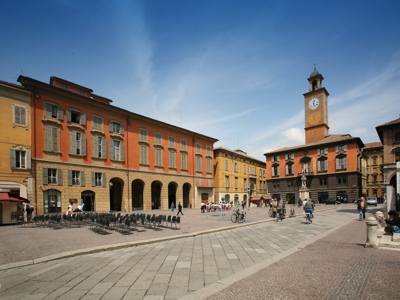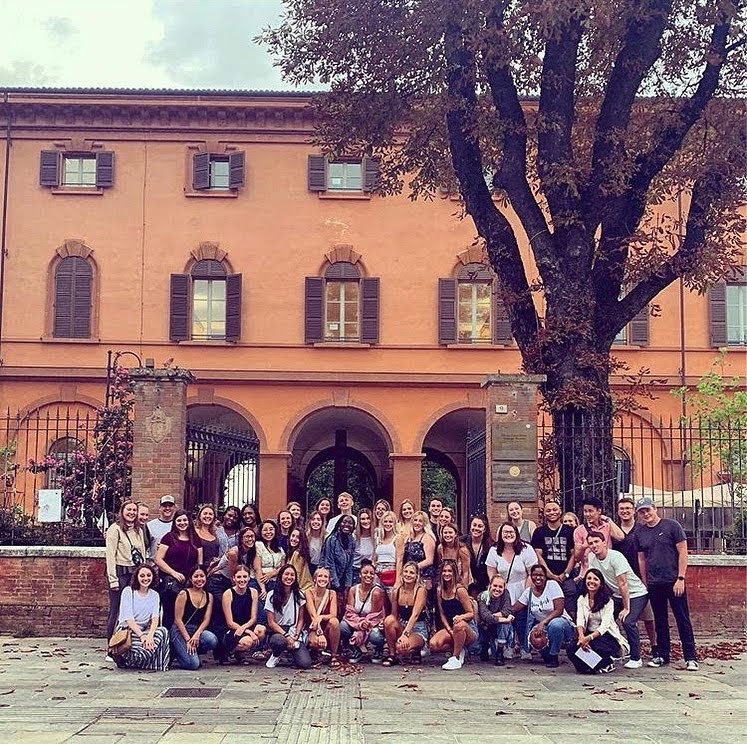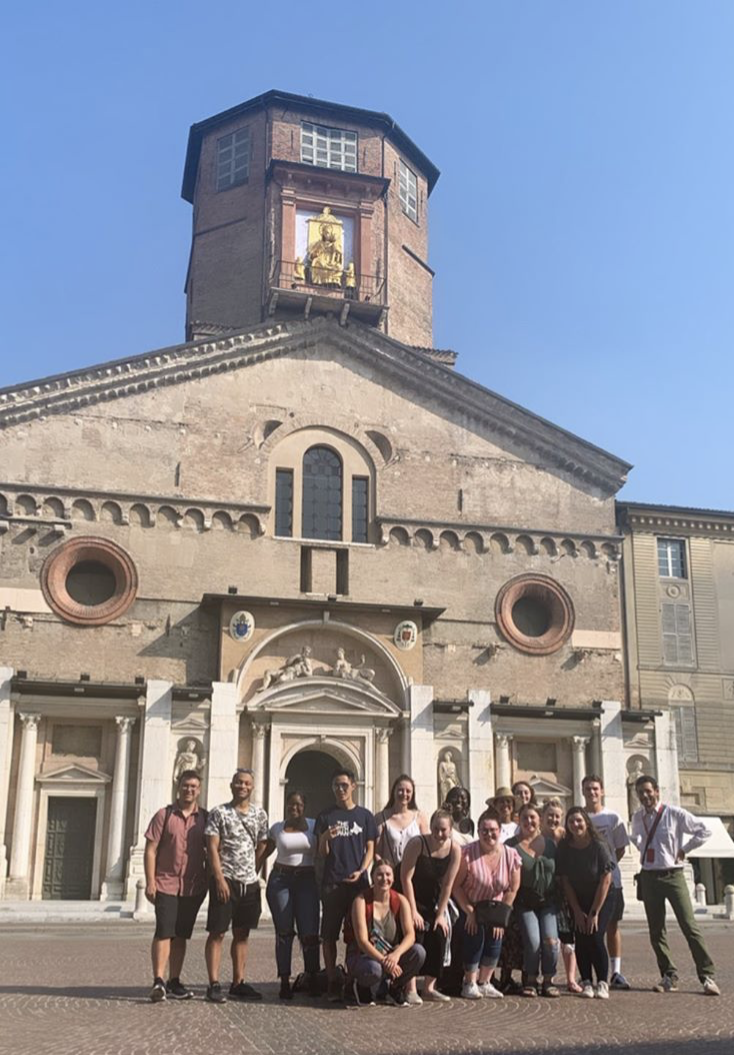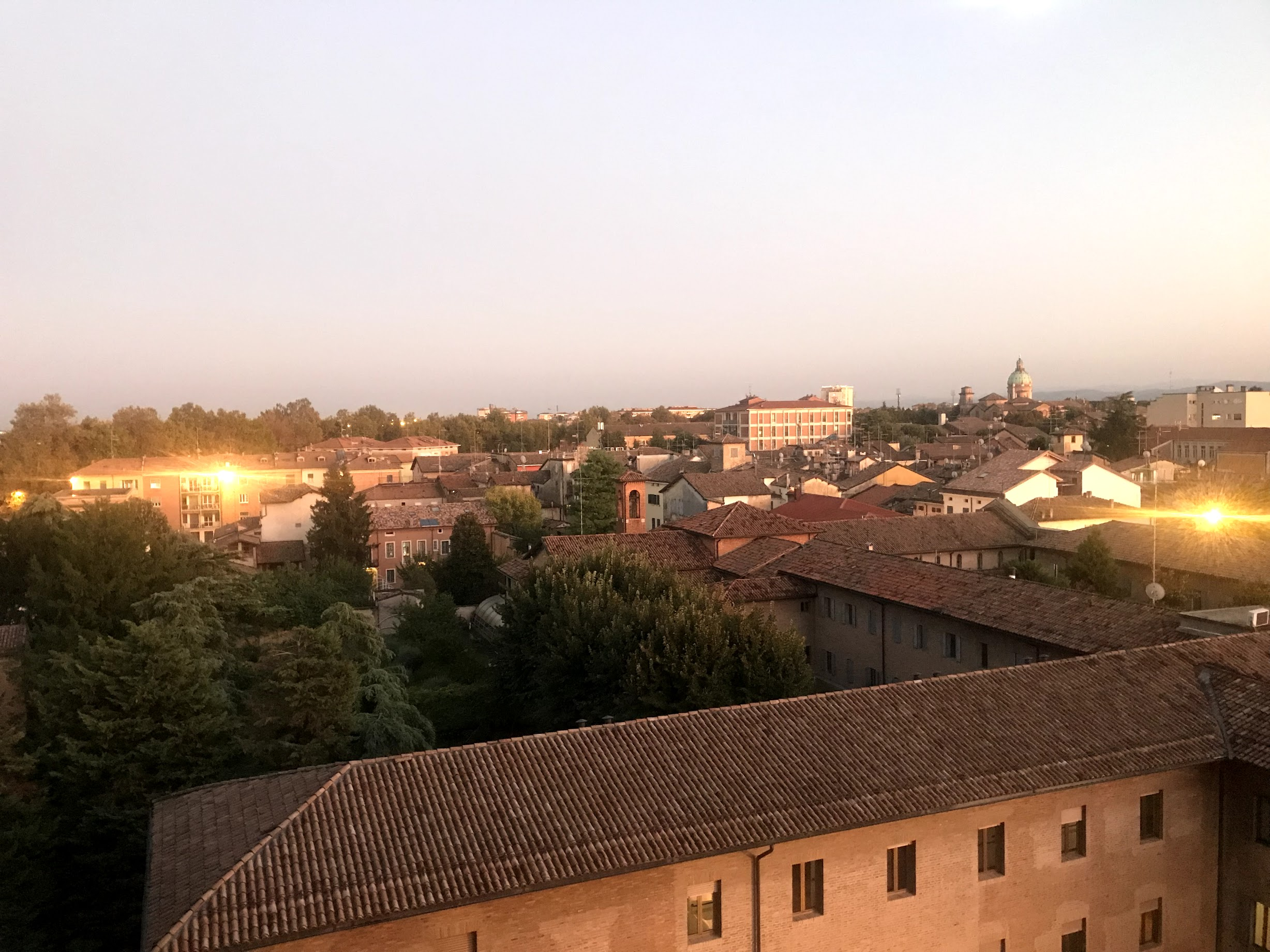Return to the search form Return to your search results
USAC Reggio Emilia Program
Fast Facts
Sessions Offered:
Fall, Spring, Summer, Academic Year
Location:
Reggio Emilia, Italy
Credit:
Resident
Eligibility:
• Minimum 2.5 GPA
• Good academic and disciplinary standing
• Sophomore, junior, or senior standing at the time the program begins
• Approval by UI and USAC
• 18 years of age
• Check the 'Eligibility' section under the Application tab for more details.
Application Due:
• September 19 for Spring
• February 24 for Fall and Academic Year
• March 4 for Summer
Program Cost:
Check the 'Costs' section under the Application tab.

Reggio Emilia
The program is administered by the University Studies Abroad Consortium (USAC), of which the University of Iowa is a member. The USAC Resident Director and staff are present on-site full-time to welcome and support you during your term abroad.
Reggio Emilia is a mid-sized city in north-central Italy. This city of Roman origin, birthplace of the Italian tricolor flag, is rich in history, culture, and tradition. The city is known worldwide for its unique teaching philosophy and cuisine. The Reggio Emilia program is ideal for students interested in education, communications, health/nutrition, and Italian studies.
Academic Program

The program offers a high-quality educational experience in a variety of academic areas including education, communications, health/nutrition, and Italian studies. These programs are not exclusive of one another; you may choose courses from any area. USAC classes are held at the Reggio Emilia campus of the University of Modena and Reggio Emilia (UNIMORE).
The list of current courses can be found here: USAC Course Offerings
Students receive University of Iowa resident credit for the courses taken on this program.
Fall, Spring, and Academic Year
Students will enroll in 12 to 18 s.h. per semester comprised of an Italian language course (required) plus electives in education, communications, health/nutrition, and Italian studies. No prior language study is required to participate. A 3 s.h. internship may also be availableSummer
USAC’s Summer I, Summer II, and Summer I & II sessions take place during the University of Iowa’s summer session. UI students can enroll in either session or both sessions.
Students will enroll in 3 s.h.- 6 s.h. per session. At least one 3 s.h. is required each summer session. Note: UI students need to take a minimum of 6 s.h. during the summer to be considered full-time students and to gain financial aid eligibility.
Applying credit toward a UI degree
Unless UI Study Abroad has an approval on file for the courses you take abroad to be applied toward a specific major, minor, certificate, or general education requirement, you will receive general elective credit for your course. The course approval process will be discussed when you meet with your study abroad advisor.
Cultural Activities

Theater in Reggio Emilia
You are encouraged to participate in the included program excursions and activities, in addition to the field trips built into some of your courses. Dates and exact locations are at the discretion of the Resident Director and they vary from session and session and semester to semester.
More information about excursions and activities can be found on the USAC website.
Program Dates
Program dates vary from year to year, but typically follow the University of Iowa’s academic calendar.
This program is offered for a semester, academic year, or during the summer session.
Two month-long sessions are offered each summer. Students can choose to study during either one or both of the summer sessions.
You can find the specific dates for the upcoming sessions on the USAC website
For More Information
Steps to Studying Abroad
- Before initiating an application with USAC, students must complete a Discover Study Abroad session at the University of Iowa.
- After completing the Discover Abroad session, students will receive an email with their study abroad advisor assignment.
- Once assigned, students must meet with their study abroad advisor to receive program application instructions.
Study Abroad
1111 University Capitol Centre
Iowa City, IA 52242
Phone: 319-335-0353
Email:study-abroad@uiowa.edu
University of Modena and Reggio Emilia (UNIMORE)
USAC classes are held at the Reggio Emilia campus of the University of Modena and Reggio Emilia (UNIMORE), rated the second-best public university in Italy.
Students will have access to the university’s facilities including their modern library, and café. Program participants can take part in activities organized by the Italian student life association (Uni-life) on campus and in the community. Sign up for a language partner to practice Italian while helping local students learn English.
Reggio Emilia

Students in Reggio Emilia
- Population: 173,000
- Distance from Rome: 270 miles
- Distance from Torino: 168 miles
Situated in Northern Italy, in the Po Valley, Reggio Emilia borders Parma’s territory to the west and Modena’s territory to the east. In the north, the River Po separates its territory from the province of Mantua, while in the south the Apennines mark the border with Liguria and Tuscany.
Reggio, also known as the Tri-colour town — it was here that the Italian flag was adopted for the first time in 1797 — has an ancient history: in the 11th century, the town was the heart of Matilde’s county in the neighboring territory. Later, important figures marked its Renaissance, ranging from Boiardo to Ariosto, the great poet of Orlando Furioso.
Nowadays, Reggio is famous for its gastronomy, lifestyle quality, and the “best kindergartens in the world.” It is also a city of art, whose symbols are the seventeenth-century Basilica della Ghiara and the famous Teatro Municipale. Contemporary signs are visible, for those driving along the A1 motorway, in the bridges designed by architect Santiago Calatrava for the Alta Velocità (High Speed) station.
Italy

Aside from the unending, tangible history in Italy, the nation has beyond remarkable landscapes which bring any visit to an entirely new level. You can go skiing in the Alps, visit Roman ruins and Greek temples, or explore the Grand Canal in Venice.
As one of the world's most-loved destinations, Italy is also the land of la dolce vita meaning "the sweet life." After an adventure, tourists can unwind, relax, and be pampered by staying at one Italy’s high-end spas or simply enjoying Italy's sophisticated dining pleasures, such as family-owned restaurants where you can experience real Italian cooking.
US Department of State Country Information
The US Department of State provides safety and security information for every country of the world to help you assess for yourself the risks of travel. Each country information page contains a Travel Advisory, Alerts, and other important details specific to that country that could affect you.
Pay close attention to the entry and exit requirements, local laws and customs, health conditions, and other details to help decide whether traveling to any given country is right for you. Non-US citizen travelers may also wish to seek guidance from the embassy of their country of citizenship. The UI International Travel Policy for Students addresses restrictions on student travel to high-risk locations and engagement in high-risk activities abroad.
Living Arrangements

Students can choose to live in apartments or in a homestay. Accommodations are arranged by USAC in consultation with the student. More information about housing can be found on the USAC website.
- Apartments: Most students share private apartments with 2-5 other USAC students. The apartments are modestly furnished with double occupancy rooms. Single rooms may be available for an additional fee but cannot be guaranteed.
- Homestay: Occasionally there may be the opportunity to live with local Italian singles, students, or families. However, this is a limited option, and availability can’t be guaranteed.
Housing Fees
During the semester and academic year sessions, the housing fee is not included in the course fee. Students pay rent for their accommodations each month. You will need to have a plan and budget in place to withdraw the amount needed for monthly rent.
For summer programs, housing is included in the course fee.
Passport
If you do not have a passport, it is important that you apply for one as soon as possible to ensure you receive it before the program begins. US citizens can find more information about how to apply for a passport on the US Department of State’s website.
Important notice for students without a valid passport or whose passport will expire within the next 12 months:US citizens can find more information about how to renew a passport on the US Department of State’s website.
Students with a valid passport should check the expiration date. Passports must be valid for at least 6 months AFTER the anticipated return to the US from studying abroad. If your passport is not valid for at least 6 months after your anticipated date of return to the US, you must renew your passport before applying for the visa you will need to enter your host country.
Expedited processing service is available for US passports (although this still takes several weeks and is at an additional cost). UI Study Abroad encourages students to ask the passport agency at the time of application whether expedited service is recommended.
Non-US Citizens
Students who are not US citizens should contact their consulate for more information if they need to get a new passport or renew their passport.
Travel Arrangements
Students will work with their program provider to make travel arrangements to their program site. The cost of travel is not included in the course fee. UI Study Abroad will not arrange a group flight to your study abroad destination.
Do not purchase plane tickets until you have received instructions on how to do so from your program provider.
Local Transportation
Within your host city and around Italy, students will utilize public transportation such as buses and trains. Italians are also very used to walking, so be sure to bring comfortable shoes!
Eligibility
This program is open to University of Iowa students who fulfill the following requirements:
- Clear interest and commitment- Students must demonstrate a clear academic or personal interest in the program’s subject matter, and a commitment to engage responsibly in coursework abroad.
- Demonstrated preparedness and maturity- Students must demonstrate preparedness to take on the heightened responsibilities associated with international study and travel. Students must demonstrate a commitment to behave responsibly abroad while respecting cultural differences. Students are expected to obey both local laws and program directives conveyed to participants before and during the program. The University of Iowa Code of Student Life applies to all program participants while abroad.
- Minimum 2.5 GPA- Students must have a minimum 2.5 GPA to participate in this program. Applications from students who have a GPA below 2.5 will be considered on a case-by-case basis.
- Good academic and disciplinary standing- Students must be in good academic and disciplinary standing at the University of Iowa. Students placed on either academic or disciplinary probation for any period of time overlapping with the study abroad program dates are ineligible to study abroad on a University of Iowa program. Academic and disciplinary history will also be considered when determining whether a student is prepared to represent the University of Iowa as part of this program. Students who are not in good standing at any point overlapping with the program dates will have their acceptance revoked and will be responsible for the associated late withdrawal fees.
- Sophomore, junior, or senior standing- Applicants must have sophomore, junior, or senior standing by the time the program begins to participate in this program.
- Approval by USAC and UI Study Abroad- Applications will be reviewed by UI Study Abroad and by USAC. Students will be accepted based on their review of their application materials.
- Attendance at mandatory orientation programming- Students must attend all in-person and online pre-departure orientation programming presented by UI Study Abroad and USAC.
Costs
Costs charged to the U-Bill
- Application fee (charged at the time of application, before financial aid/scholarships disburse)
- Course Fee- Includes program course fee, tuition, all or some housing fees, pre-departure advising, airport pickup for those on the group flight, on-site orientation, 24-hour local emergency staff support, and program-organized field trip and excursions. (charged shortly before departure)
- University of Iowa Study Abroad Administrative Fee (charged shortly before departure)
- The mandatory Iowa Regents CISI Health Insurance (charged shortly before departure)
Out-of-pocket costs (not charged to U-Bill)
- Round trip airfare (paid by student directly to travel agent or airline- approx. 6-8 weeks prior to departure, before financial aid/scholarships disburse)
- Passport (paid by student prior to departure, before financial aid/scholarships disburse)
- Consular and visa fees (paid by student prior to departure, before financial aid/scholarships disburse)
- Textbooks, copyright permission fees, course packets, and other course-related materials (paid upoon arrival to your host country)
- Medical exam/immunizations (paid by student as needed prior to departure, before financial aid/scholarships disburse)
- Personal expenses and personal travel (paid by student as needed while abroad)
- Rental or purchase of required cell phone- does not include usage fees (paid as needed while abroad)
Cost Sheets
Semester
 USAC Reggio Emilia - Fall 2025
USAC Reggio Emilia - Fall 2025 USAC Reggio Emilia - Spring 2025
USAC Reggio Emilia - Spring 2025Summer
 USAC Reggio Emilia Summer Session I - 2025
USAC Reggio Emilia Summer Session I - 2025 USAC Reggio Emilia Summer Session I & II - 2025
USAC Reggio Emilia Summer Session I & II - 2025Scholarships & Financial Aid
Most financial aid (scholarships, grants, and loans) is applicable to study abroad programs. Please check the Study Abroad website for information on financial aid and how it may be applied to studying abroad. You are also encouraged to speak with someone at the Office of Student Financial Aid to explore financial aid options. Scholarship opportunities exist for study abroad participants. Please explore Study Abroad’s websites for UI Study Abroad Scholarship Opportunities.
USAC has several scholarships and grants as well. You can find these on USAC Scholarships & Discounts website.
How to Apply
- Before initiating an application with USAC, students must complete a Discover Study Abroad session at the University of Iowa.
- After completing the Discover Abroad session, students will receive an email with their study abroad advisor assignment.
- Once assigned, students must meet with their study abroad advisor to receive program application instructions.
Students will need to complete a University of Iowa Study Abroad application and a USAC online application. Information on these applications will come from the study abroad advisor. Final program admissions decision is made by USAC.
Application Deadline
Applications for the Fall and Academic Year are due on February 24.
Applications for the Spring session are due on September 24.
Applications for the Summer session are due on March 4.
Health & Safety Planning
In addition to submitting their Confirmation of Participation form, students should review the following:
Study Abroad ResourcesIowa Regents CISI Health Insurance Information
Students are also encouraged to complete the Health Preparation Guide for International Travel form with their medical practitioner. This document is intended to help you plan for your medical needs abroad. Please DO NOT turn this form in to UI Study Abroad.
Health Preparation Guide for International Travel form with their medical practitioner. This document is intended to help you plan for your medical needs abroad. Please DO NOT turn this form in to UI Study Abroad.
Visa
U.S. passport holders should follow the Visa batch process instructions provided by USAC. These can be found in your USAC Gateway account in the Documents tab. Make sure to submit all required documents by the submission deadline. Otherwise you will have to apply for your student visa independently.
The closest Consulate available to UI students is the Chicago consulate.
U.S. Citizens will need a student visa if they are going abroad for a semester, or academic year. Typically, they will not need a visa for the summer sessions.
Non-US Citizens- should refer to the Italian Consulate Website for more information on Italian visa requirements.
UI Study Abroad will hold advising appointments and/or information sessions to provide details on the visa application process. UI Study Abroad staff can provide some assistance on the Italian visa application process, but ultimately the individual traveler (the student) is the person who is responsible for providing correct information on the visa application and securing the visa and all other required documentation prior to travel.
Prior to starting the visa application process check in with USAC for more information; they have a preferred timeline that students need to follow.
Orientation
In order to prepare for your time abroad, you are required by the University of Iowa to complete two orientations. These may be in addition to orientations provided by your on-site provider. See below for more information.
Online Education Abroad Pre-Departure Orientation
You are required to complete the International Programs ICON course "Education Abroad Pre-Departure Orientation" prior to departure. This orientation is mandatory for all students going abroad under the auspices of the University of Iowa. It covers many practical matters about living overseas, such as health and safety, communication, money, goals, and much more. You will be enrolled in this course by International Programs and an email will be sent to you once enrolled. If you have any questions, you can email safety-abroad@uiowa.edu
Program-Specific Orientation
This orientation will be facilitated by your study abroad advisor and will cover content specific to your program and host country. It could be conducted in a group setting or one-on-one depending on your type of planned activity abroad. Your study abroad advisor will send you more information about this mandatory in-person session.
Predeparture Resources
USAC will provide you with a variety of pre-departure resources to prepare you for your study abroad experience. These will include a packing list, cultural information, housing instructions, etc. Ensure that you thoroughly review any information provided to you by USAC and refer back to it if you have any questions.
These materials may be periodically updated to reflect new program information prior to departure. Be sure to check your USAC Gateway Account often.
